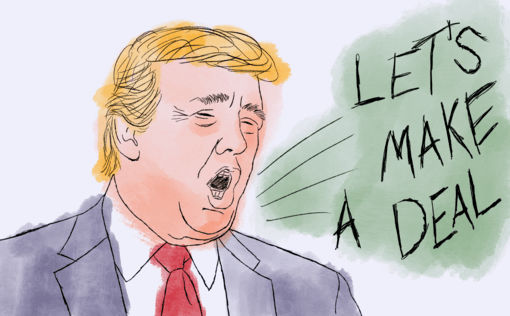
Drawing by Nathaniel St. Clair
Last week Donald Trump, the self-proclaimed Master of the Deal, walked away from his second summit with the North Korean leader empty handed. There was no agreement on denuclearization and ending sanctions. For all the pre-meeting hype, there was no deal.
What’s the big deal?
Trump the Promoter has promoted business-speak and a business mentality into the public sphere. While we normally use the word “deal” in a business sense, President Trump has brought business talk/attitudes into diplomatic discourse. Traditional terms such as compromise or consensus have fallen prey to financial terms such as “deal,” with all the wheeling and dealing that it entails. Instead of talking about the common good, public commons or communal values, Trump has reduced diplomacy to a language of a used-car salesman. “It’s a deal. Let’s shake on that,” has replaced consultations, formal negotiations, signings and ratifications.
Instead of negotiation, we are presented with personal confrontations. Mano a mano, hand-to-hand, the leaders are presented as involved in a form of verbal confrontation. And the reporting of the face-to-face meetings between Trump and Kim Jong-un show this decline. “Trump-Kim summit no victory…” CNBC summarized an analyst’s comments.
For behind the personalization of the meetings, civil servants should have constructed scenarios to prepare the leaders for the negotiations through sophisticated simulations. What the media presents, and what we are led to believe, is that individuals sit down, like at a poker table, to wager, bluff and try to outsmart each other. “Trump challenged the North Koreans to offer more or ‘go all in,’ but Kim would not agree, a US official at the talks said afterward,” Aljazeera reported.
Donald Trump has tried to glorify his ability to woo the adversary through his skill as a Master of the Deal and seducer. His personal comments about the North Korean leader reflect his belief in his ability to charm: “Our relationship is a very special relationship,” he told reporters before the summit meeting broke up. Previously, Trump had boasted that Mr. Kim “wrote me beautiful letters.And they’re great letters.” He said, “We fell in love.” This personalization reinforces the face-to-face and his deal-making abilities which belie the overall political/diplomatic nature of the negotiation and its complicated history.
We’ve seen this before. Recall when Presidents George W. Bush and Vladimir Putin met for the first time in June 2001 in Slovenia. Bush enthused: “I looked the man in the eye. I found him to be very straight forward and trustworthy and we had a very good dialogue. I was able to get a sense of his soul.”
What about NATO expansion? What about United States missile defense plans for Eastern Europe? Although the press reported that the two leaders had “gotten on far better than expected,” they also reported that the summit “leaves Russia and the US little closer to resolving the issues that divide them.” Should we care if the atmosphere “was one of friendly cooperation” if there were no concrete results? Should we care if Kim wrote “great letters” to Trump if he continues his nuclear development and horrendous human rights record?
(To be fair to Trump, if one must, at least in the case with China, Trump has allowed professionals to carry on trade negotiations after his first meeting with Xi Jinping at Mar-a-Lago in 2017. He seems to recognize that the complexity of the trade issues goes beyond a simple face-to-face meeting and that his charms do have certain limits, at least with the Chinese.)
Adding to the personalization of the “deal” are the results of summits analyzed in terms of win-lose, just like on a sports page. Who is the winner? Who is the loser? “Trump ‘biggest loser’ from Hanoi summit,” headlined the BBC. (Remembering that the three major American sports – football, baseball and basketball – have no tie games) As a result, negotiators are thinking about how the results will be perceived in their respective countries in win/lose terms instead of thinking about some general good.
The real art of negotiation is to have both sides feel they have done something in their mutual interest. The objective of all serious negotiators is win-win, if we must use that expression. Great negotiators are not deal makers in the Trumpian sense. Getting to Yes, Roger Fisher’s and William Ury’s classic guide to negotiation and the basis of the Program on Negotiation at Harvard Law School, is all about win-win situations, not about deals. Donald Trump proclaims himself the Master of the Deal, but his failure in Vietnam to reach a deal on North Korea’s denuclearization is further proof that “deals” are not negotiations. Using the language of “deals” is further evidence of junk politics.